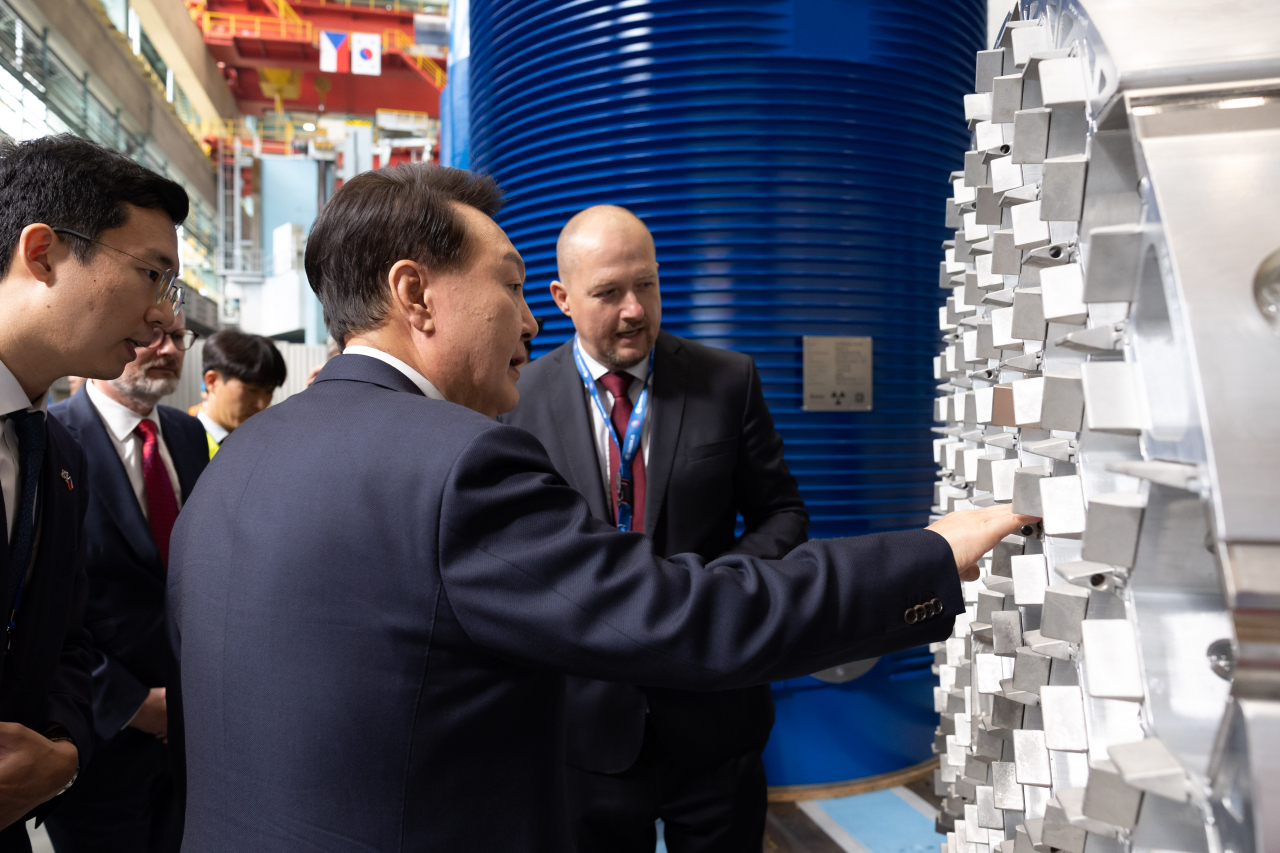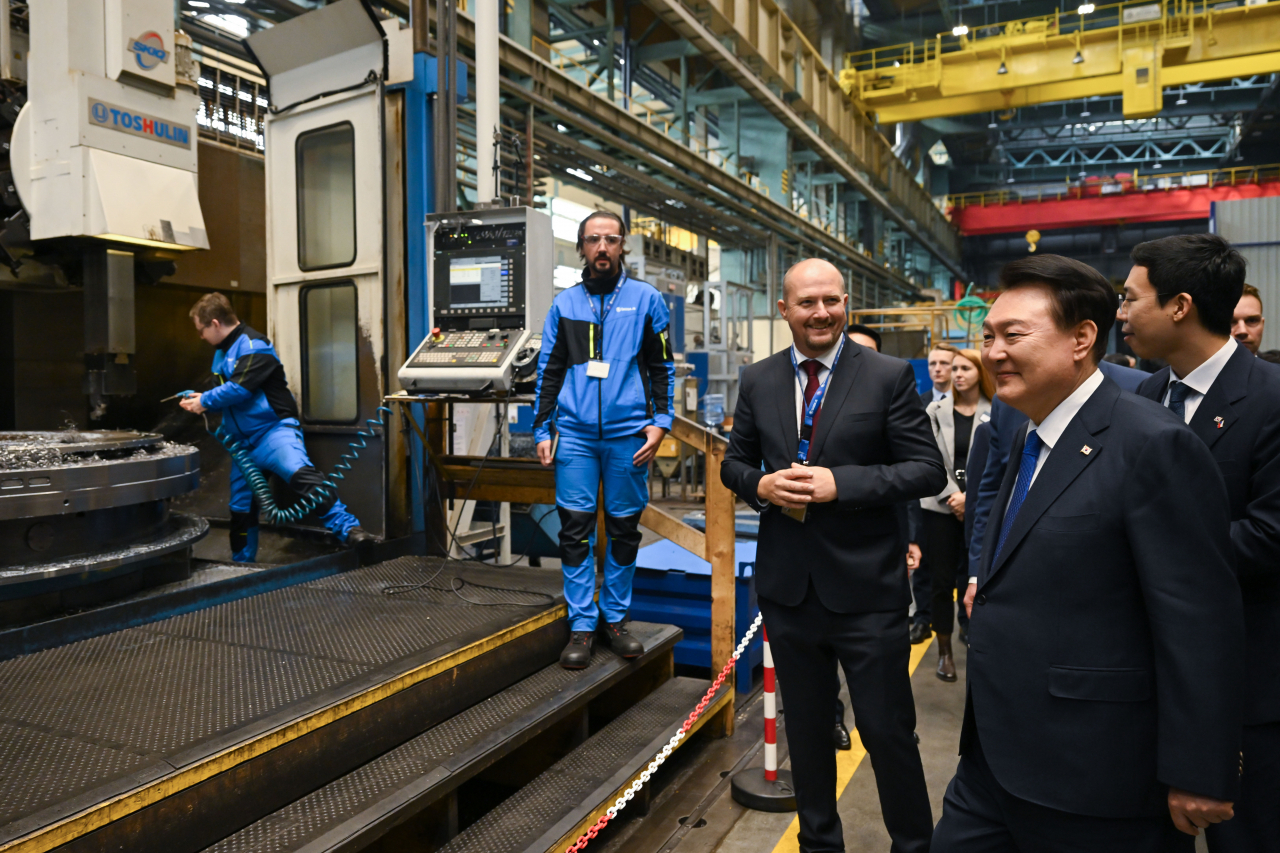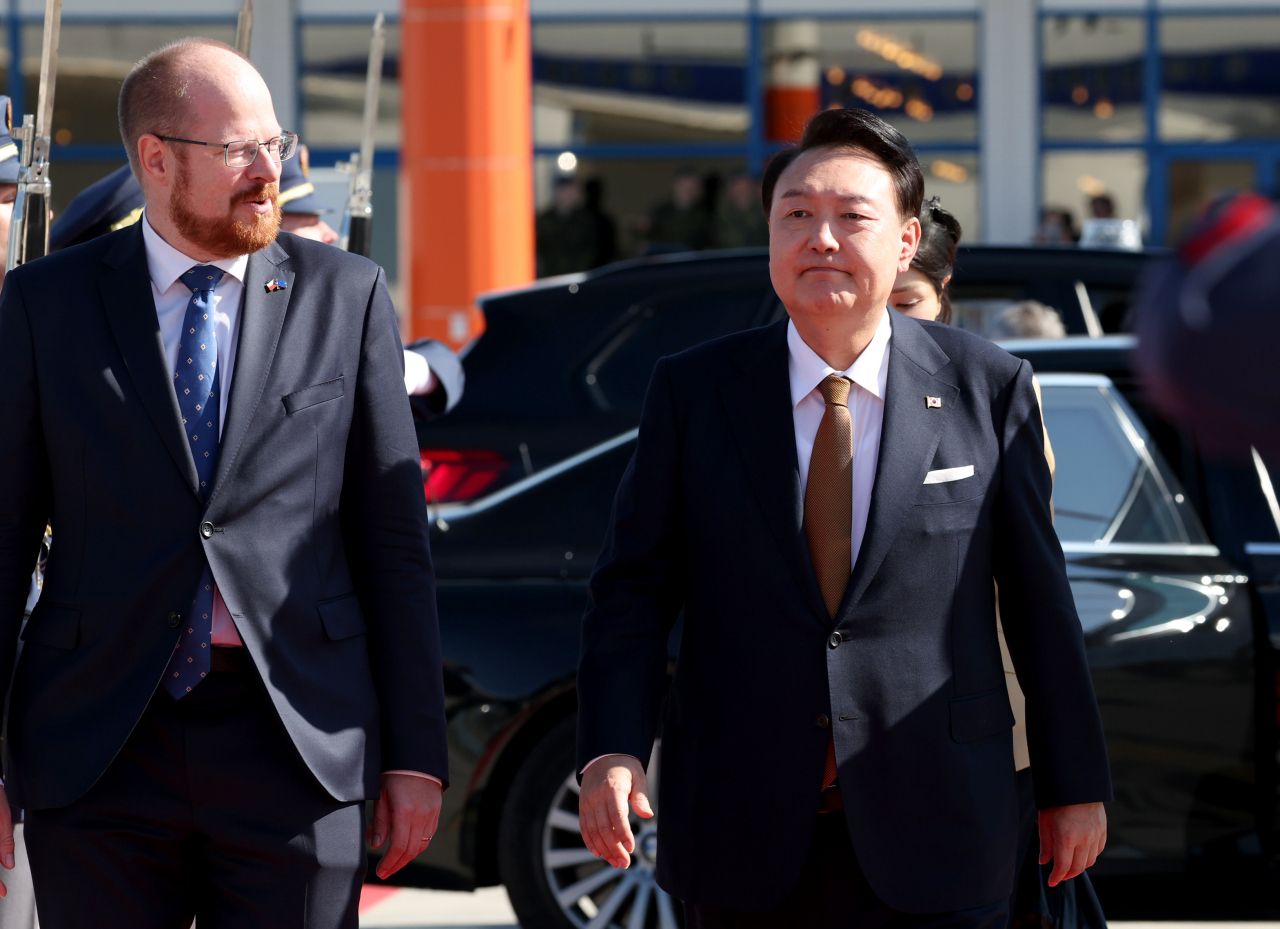 |
President Yoon Suk Yeol (front) inspects a production facility of Skoda JS, a Czech company dedicated to nuclear servicing and engineering, with Czech Prime Minister Petr Fiala (second from left) in Plzen, Czech Republic, Friday. (Pool photo via Yonhap) |
President Yoon Suk Yeol returned to Seoul on Sunday following a three-day official trip to the Czech Republic, setting the stage for a South Korean consortium to finalize a nuclear energy deal worth 24 trillion won ($18 billion) in the central European country next year.
Laying the groundwork for further discussions and procedures before the final signing of the contract, hopefully in March 2025, Yoon, Czech President Petr Pavel and Czech Prime Minister Petr Fiala "reaffirmed their commitment to the successful delivery of Czech nuclear projects" in bilateral talks in Prague, the Czech capital, beginning Thursday, according to Yoon's office.
Yoon and Fiala also visited the headquarters of Doosan Skoda Power, a Czech manufacturer of steam turbines for power generators based in Plzen, 80 kilometers west of Prague, Friday. The two attended a signing ceremony of a list of memorandums of understanding that stipulate the two countries' collaboration throughout the delivery of a nuclear energy project. Among the attendees were Daewoo Engineering and Construction Chair Jung Won-ju, Doosan Group Chair Park Jeong-won and Korea Hydro and Nuclear Power CEO Whang Joo-ho.
Spurred by Yoon's visit, 13 documents were signed to ensure cooperation in the preconstruction, construction and postconstruction stages of the nuclear power unit construction project, in which public- and private-sector entities of both countries are to collaborate to supply and localize equipment for nuclear reactors, design and test-run the units, develop nuclear fuels and dispose of radioactive waste, among other tasks.
The two countries also agreed on a joint effort to train nuclear power technicians and share information and technology related to nuclear energy.
The move will allow South Korean firms to "institutionalize comprehensive civil nuclear energy cooperation, from construction to research and human resources development," Yoon told a press conference Friday after he met with Fiala, who announced in July Prague's selection of the KHNP-led consortium as the preferred bidder to build at least two 1,000-megawatt nuclear energy units in the Czech Republic.
Yoon also said he promised Fiala that South Korea would "pay extra attention to enhance the Czech Republic's national competitive edge, develop its human resources and contribute to the growth of the local economy" through the 24 trillion won project in Dukovany, a city 170 kilometers southeast of Prague.
 |
President Yoon Suk Yeol (second from right) inspects a production facility of Skoda JS, a Czech company dedicated to nuclear servicing and engineering, in Plzen, Czech Republic, Friday. (Pool photo via Yonhap) |
Before Yoon departed for Prague, US-based energy firm Westinghouse Electric's ongoing licensing dispute with KHNP, as well as its formal appeal with Czech authorities over its decision, had emerged as a potential obstacle in preventing the KHNP-led group's signing of the Czech deal.
When asked whether such uncertainties were settled through Yoon's visit, an official of the presidential office who accompanied Yoon on his summits said on condition of anonymity that Czech authorities "have no alternatives to the Korean consortium in their minds over the Dukovany project," adding that what was his impression from Yoon's summits with the Czech leaders.
Czech leaders, meanwhile, have been stressing the importance of local companies' participation in the prospective project to be led by South Korean entities.
Fiala said during his visit to Plzen on Friday that he thought the localization of up to 60 percent of the work in the scope of the project is "a mandate," while urging the Czech industry to work to qualify for the KHNP's projects.
This resonates with the remarks by Jan Rafaj, president of the Confederation of Industry of the Czech Republic, during a business forum in Prague on Friday that it is "imperative" that Czech companies be extensively involved in this project on an equal footing with their Korean counterparts.
"Czech industry cannot be a supplier, Czech industry must be the partner," Rafaj also said.
A South Korean presidential office official expressed optimism that Czech businesses could potentially contribute up to 60 percent of the process, though this is not a requirement. He added that the implementation of agreements signed during Yoon's visit could achieve a level of localization that would be satisfactory to the Czech counterparts.
 |
President Yoon Suk Yeol (right) leaves Vaclav Havel Airport Prague to board Air Force One on Saturday, after wrapping up his official visit to the Czech Republic. (Yonhap) |
Attention is also being paid to whether the successful signing of the nuclear energy deal next year could stimulate ties between the two countries, as the two countries adopted action plans to implement a strategic partnership for the next three years. Seoul and Prague previously forged a strategic partnership in 2015.
The newly established Trade and Investment Promotion Framework and the ministerial-level Supply Chain and Energy Dialogue will further boost bilateral trade and investment. Trade between South Korea and the Czech Republic hit all-time highs in past years, while South Korea contributed the most in terms of its investments in the Czech Republic among non-European countries.
The two countries will also create cooperation centers for high-tech industries, including secondary batteries, future vehicles, semiconductors and robots in the Czech Republic. Research projects in a wide range of areas including artificial intelligence, nuclear energy and hydrogen will also be promoted, in part through joint funding in which South Korea will inject $37 million.
For Czech infrastructure cooperation, South Korea's Hyundai Rotem and Czech company Skoda Transformation agreed to cooperate in Hyundai Rotem's efforts for high-speed trains and electric trains there.
Seoul and Prague also agreed to collaborate to identify and implement reconstruction projects in Ukraine in areas such as transport, infrastructure and modern solutions, among others.




![[Exclusive] [Herald Interview] MBK incapable of running Korea Zinc’s Australia business: Aussie renewable energy CEO](http://res.heraldm.com/phpwas/restmb_idxmake.php?idx=644&simg=/content/image/2024/09/20/20240920050535_0.jpg)


